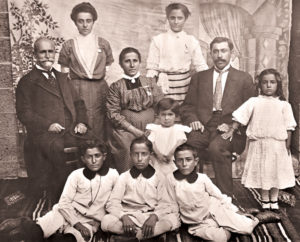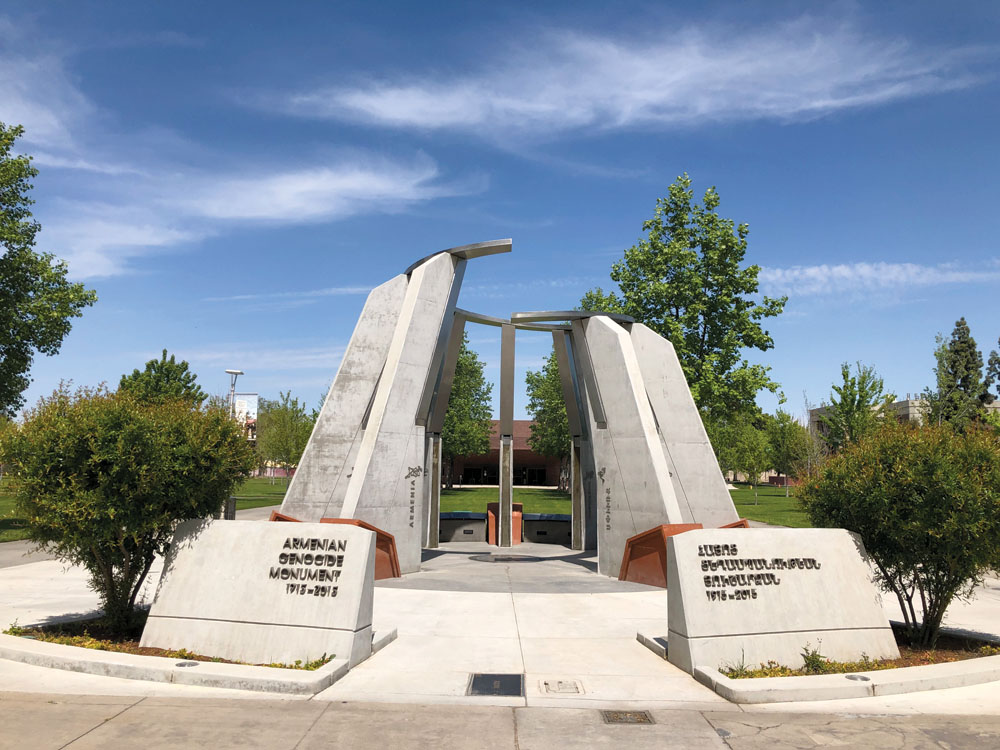
Photo: Courtesy Michael Rettig
Michael Rettig
Special to Hye Sharzhoom
For decades, Armenians around the world have congregated every April 24 to commemorate the Armenian Genocide. Protests and vigils are held in every city with an Armenian community without fail. In Yerevan, thousands march to the Armenian Genocide memorial complex at Tsitsernakaberd to pay their respects to those lost in 1915. Year after year, Armenians in the homeland and in the Diaspora, across political parties and religious convictions, have united on this day to commemorate those who were massacred and to demand recognition of the crime. Even in the midst of the 2018 anti-government protests in Armenia, now dubbed Armenia’s “Velvet Revolution,” the people and the government set aside their dispute to lay their flowers at Tsitsernakaberd. This year, for the first time, COVID-19 has grounded these sacred rituals to a halt, as people around the world hunker down in their homes to prevent the spread of this new virus.
This year, Armenians commemorated in their homes by lighting candles, attending virtual vigils, sharing stories of survival and loss passed down for generations, and connecting with fellow Armenians on social media. This was the first year in over a decade that I did not spend April 24 with the Armenian community, commemorating our shared grief while simultaneously savoring our togetherness, and the strength of our vibrant Fresno community.
Instead, my family gathered in the living room to watch a documentary about the Genocide, and to reflect on the stories that our ancestors passed down to us. This year, amid the social distancing practices that have kept many of us apart, I was particularly drawn to the letters of my great-great grandfather, Thomas Mugerditchian, who spent approximately seven years separated from his family during the Genocide.
At the outbreak of World War I, Thomas worked for the British consulate in Diarbekir, a nation suddenly at war with the Ottoman Empire. He was forced to flee at a moment’s notice without his wife and children in 1914. Thomas made his way to Egypt with the British consulate, where he would spend the remainder of World War I in the British intelligence services. His wife Esther lived in neighboring Kharpert with six of their children at the time.
The Mugerditchians were able to avoid the dangerous death marches due to the help of a Kurdish friend who warned the family not to comply with the deportation order. Esther and her children remained in Kharpert in hiding under American protection. When that was no longer safe, they paid a Kurdish tribe to smuggle them out of the Ottoman Empire and into Russia in 1916. Upon reaching a revolution-torn Russia, the family went separate ways, with the three sons (including my great grandfather Yervant) heading east to Shanghai on the Trans-Siberian railroad, and Esther and her three daughters heading west through Scandinavia and eventually to London. It was an arduous journey full of near-death experiences, but Esther and her six children would eventually reunite in Fresno; the sons first, and then the women.
Though Thomas lived a dangerous life in Cairo and Palestine with the British army, he was safe from the genocidal policies that his family and countrymen endured. At first, Thomas was able to keep some track of his family through the American consulates in the Ottoman Empire, but he eventually lost all contact with them as they fled. He did not see his family until around 1921, when he was finally able to leave Egypt for Fresno after six years apart. Thomas would not hear from them for many months while they fled. All the while, he was bombarded with reports of the atrocities his people were facing in his homeland. He understandably worried greatly about his family, and the separation wore heavily on him.
Thomas finally learned that his family made it safely out of the Ottoman Empire in the fall of 1916. His son Yervant wrote a letter from Tiflis on behalf of the family, notifying his father of their safety.
“My dear father, you will be surprised to get a letter from us from Russia. Moreover, you would be joyful to know your children were lost, but found; destined to death, but brought to life again. God heard our prayers, and with his powerful hand, saved us from the condemned and bloodstained country. I will tell you everything in more detail when I see you…If you want to listen to our complete story…take us to you, will you?”

This reunion would be impossible for several more years. In 1917, Thomas entered Palestine with the British Egyptian Expeditionary Force in their attempt to force the Ottomans out of the war.

In the process of writing my M.A. thesis, I discovered a notebook of letters Thomas wrote to members of his family from 1918 to 1919, as World War I drew to a close. In the Fall of 1918, Thomas wrote longingly to his sons, as they were the first to reach safety, asking for news of their health, details on their escape, and for updated photos, since it had been years since he had seen them. In these letters, he encouraged his sons to become successful and buy land in America.
“This is the only way you will be able to liberate your mother and sisters from this chaos. When we manage to liberate them and bring them home, it will be much easier for me to come back to you. It would be great if you could follow Amo’s lead and buy a large plot of land that will be large enough to feed our family, or even larger if that’s possible. One can achieve anything through hard work.”
His letters reflect an anxiety at the fact that he had not yet heard from his wife and daughters and did not know if they had escaped from Russia.
“I have no news from your sisters and mother, who are your flesh and blood. You can imagine how upset I am, living away from my motherland. My only pleasure in life is reading your letters. They give me hope and strength to cope with this life. I hope and believe that one day we will come together as a family, feeling happy and praising God. No matter what happens—always stay positive and joyful. Your body and soul will stay healthy only when you are happy from the inside out.”
Finally, on August 22, 1918, Thomas received a telegram from the American General Consul in London, informing him that “Your wife and the girls are going through major financial needs.” Thomas immediately wrote his wife in London, “by receiving this telegram, I realized that, together with the children…you had safely reached London. My eyes filled with tears of joy. My dear Esther, I hadn’t heard from you since January and was about to go crazy. My heart and soul were trembling, and I spent many days and nights praying for you, my dear Esther.”
He eagerly requested news from his wife and daughters. How did they escape the “hells of Turkey” and the “chaos of Russia?” What troubles had they seen? Had they encountered polar bears along their way? Did they pass through China? Thomas was similarly eager for political news about the state of the Armenians in the Caucasus, but most of all, he missed his family. “I wish I could somehow appear next to you and watch you and give hugs to you, Arpine, and our sons. My soul and all of my thoughts are always with you.” Thomas informed his wife that their three sons were also safe in America, preparing a place for them in California. It took Thomas several more years to reach Fresno from Egypt, but in May 1921, he stepped off a train in Fresno with his reunited family there, eager to greet him.

This April, many of us are going through economic hardships on top of being separated from our loved ones and community. We were not able to gather to commemorate our shared trauma and to celebrate the life we were able to build here in Fresno. April 24 has always been a day of great heartache, but also great joy for me. On this day, I feel the pain passed down from the stories of our ancestors, but it is also the one day our community gathers in its entirety, from the Armenians who have been here since the Genocide, to the Armenians who have come from other Diasporan communities, and from the Republic of Armenia. I have always taken heart in this togetherness. This year has already been hard for many of us, but we have faced worse as a people. I reflect on my great great grandfather, who spent seven years away from his wife and seven children. All of us have these stories, and so few of them end in a happy reunion. I reflect on Thomas’s words to his wife in 1919: “We will make prosper everything the enemies once destroyed. Pull yourself up, darling, and never be afraid of anything. No matter what happens—always stay positive and joyful.”
It might just be this year that we are not able to commemorate as a community, it might be more. Nobody really knows how long this virus will alter our lives, but I do know we will be here to commemorate together when this passes, in every corner of the world, as we have for decades. We will make prosper, no matter the hardships.
To contact Michael Rettig: mrettig376@gmail.com

 Hye Sharzhoom Armenian Action
Hye Sharzhoom Armenian Action